Private "People's Papers"
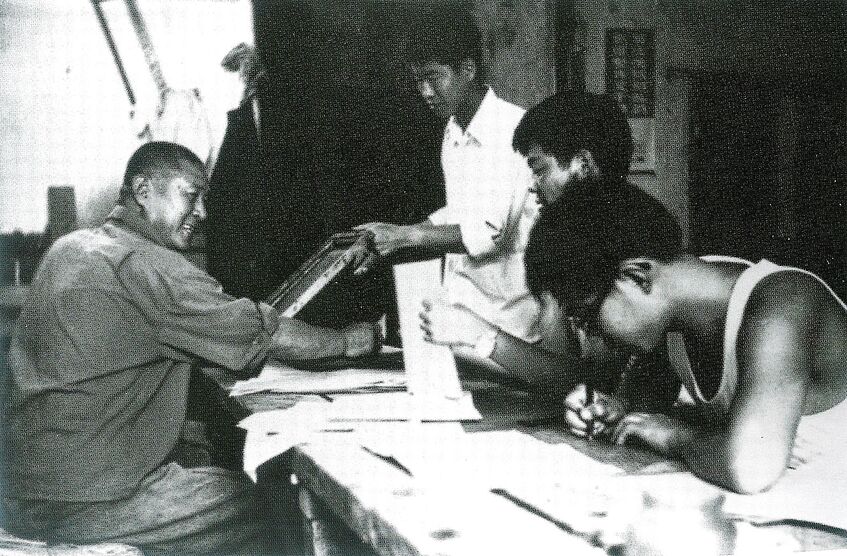
Production of the journal "Jintian" ("Today") in an apartment home
The Independent Publications
Some sources speak of more that one hundred individual publications that were produced independently from the governmental publishing monopoly in Beijing and a considerable number of other cities. Sometimes they only bring out a single issue, other magazines publish more than ten issues, in some cases over a time frame of more than two years, with interruptions though due to political circumstances.
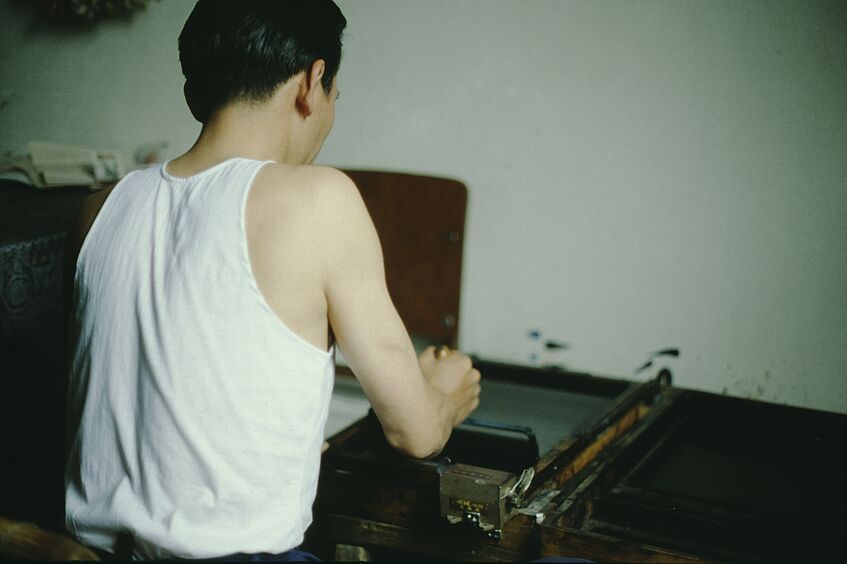
Xu Wenli ("April 5th Forum") at the mimeograph
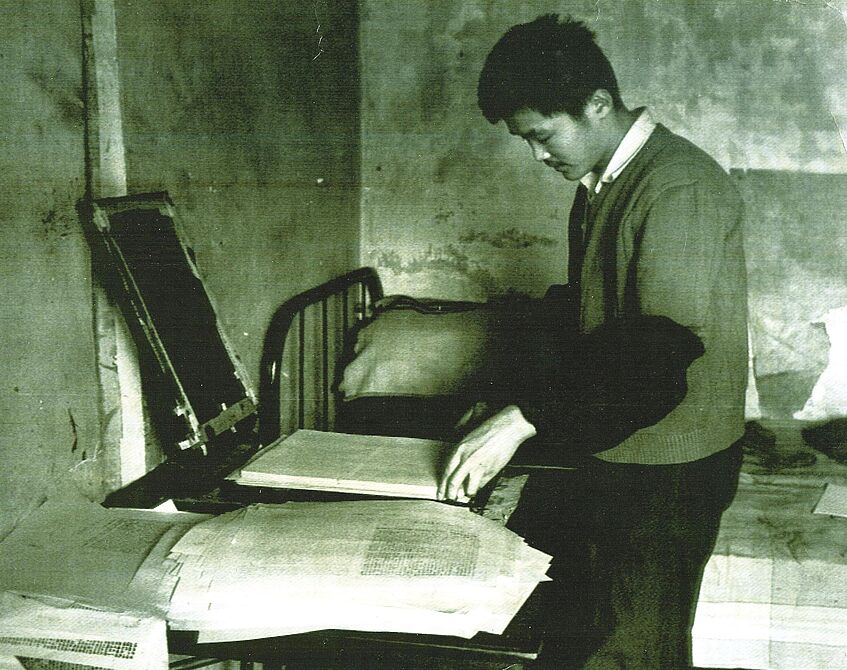
Printing a magazine in a private flat
Practically all of the publications were "mimeographed" (like school magazines or university scripts in the past). Texts were transfered by hand (seldom by a typewriter) to a wax stencil that was fixed to a "mimeograph" - often a simple wooden or metallic frame. A platen-roller pressed ink through the stencil on a sheet of paper where the text appeared - page by page, before the individual sheets were stapled together to form a magazine.
Production usually took place in private apartments, the printing devices would stand next to a bed or a sink. Editorial meetings were also held in the flats of the authors.
Paper and ink were usually difficult to buy in larger quantities, so they were sometimes procured from offices or schools. The clumsy Chinese typewriters only existed in bigger official institutions and were usually out of reach. A brief video shows the production of the journal "April 5th Forum" by Xu Wenli.
These are the reasons why only small numbers of the journals could be produced, typically a few hundred copies. The printing quality also varied a lot, texts were in some cases hardly legible. Only one issue of "The Spring of Peking" got, with the support of sympathizing officials, produced on a professional printing machine and reached a circulation of ten thousand copies.
Subscriptions and Direct Sales
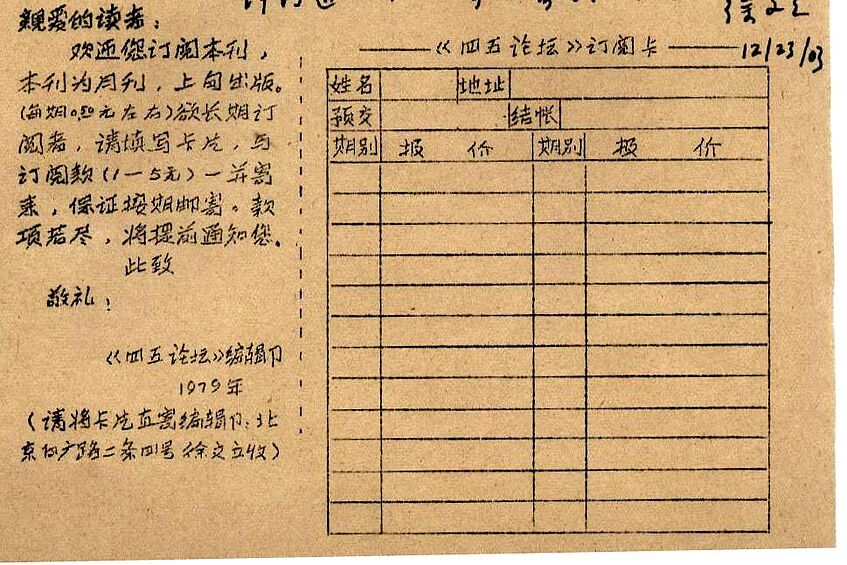
Subscription form for the magazine "April 5th Forum" with Xu Wenli's private address
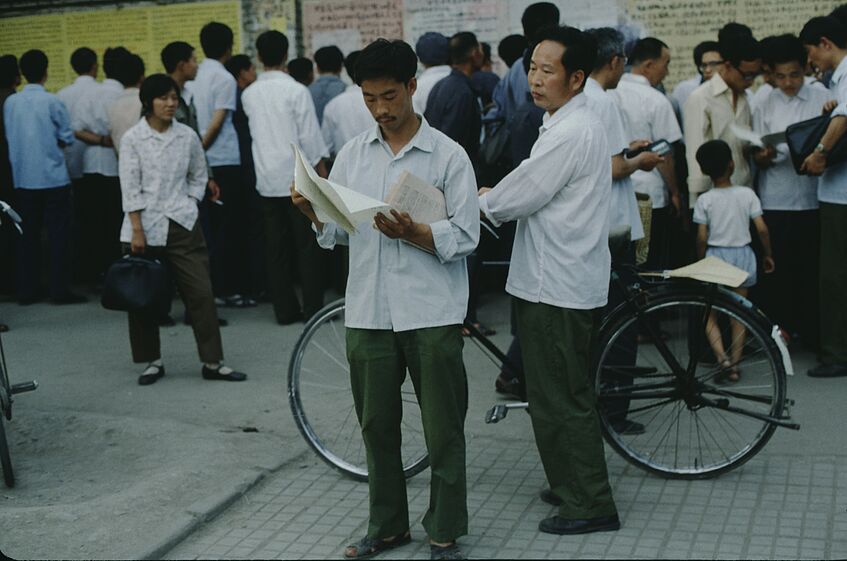
A new edition immediately finds its readers.
Subscriptions and Direct Sales
In Beijing the journals are sold mainly at the Democracy Wall, posters usually announce the release of a new issue one or two days before. One copy is usually posted at the Wall, for those who cannot get hold of one, or who rather like to take a look first before buying. People may also subscribe to the journals, and the various issues are usually exchanged between the different independent editorial teams across the country.
The sales prices (usually around 0,50 yuan) are higher than for most official magazines, the editors are also soliciting financial support from buyers and subscribers, and foreigners are commonly asked to pay a much higher price (5-10 yuan).
Not all the journals provoke political controversy, many articles even seem trivial and of little relevance. Reports and analyses are of varying quality. But there are some journals that are more sophisticated. They (and their editors) quickly become mouthpieces of the Democracy Movement.
The "April 5th Forum" (Si Wu Luntan 四五论坛)
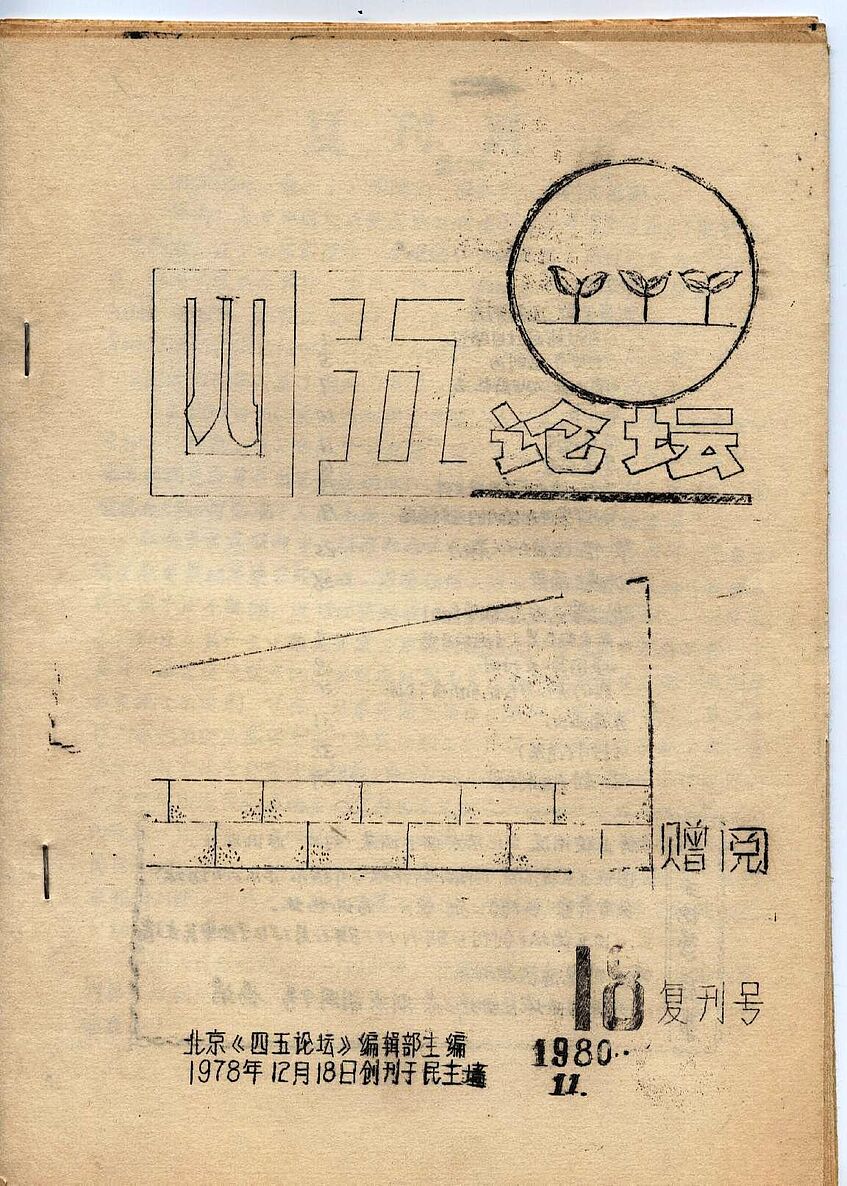
The last issue of the "April 5th Forum" from November 1980
The "April 5th Forum" (Si Wu Luntan 四五论坛)
Originally two seperate journals, the "April 5th Paper" (Si Wu Bao 四五报) and the "People's Tribune" (Renmin Luntan 人民论坛) under their respective editors Xu Wenli (徐文立) and Liu Qing (刘青) joined in November 1978 to create a new magazine that should publish eighteen issues till 1981 und thus became the longest-lived and one of the most influential publications of the Democracy Movement. Xu Wenli became a spokesperson of the "moderate" faction of the movement that tried to avoid total confrontation and believed in the possibility to reform Chinese socialism.
The journal supported though civil rights and democratic reforms, but it criticized for example an "open letter" that the Enlightenment Society had written to US President Carter to ask for support.
The "April 5th Forum" also argued against Wei Jingsheng's radical text that had attacked Deng Xiaoping as "dictator". Nevertheless when Wei got arrested, the journal demanded his immediate release, and in September 1979 it published Wei's secretly recorded defense speech at his trial. Foreign journalists and the general public were not admitted to the court proceedings, but through the "April 5th Forum" transcripts international media were able to take up these news.
"Exploration" (Tansuo 探索)
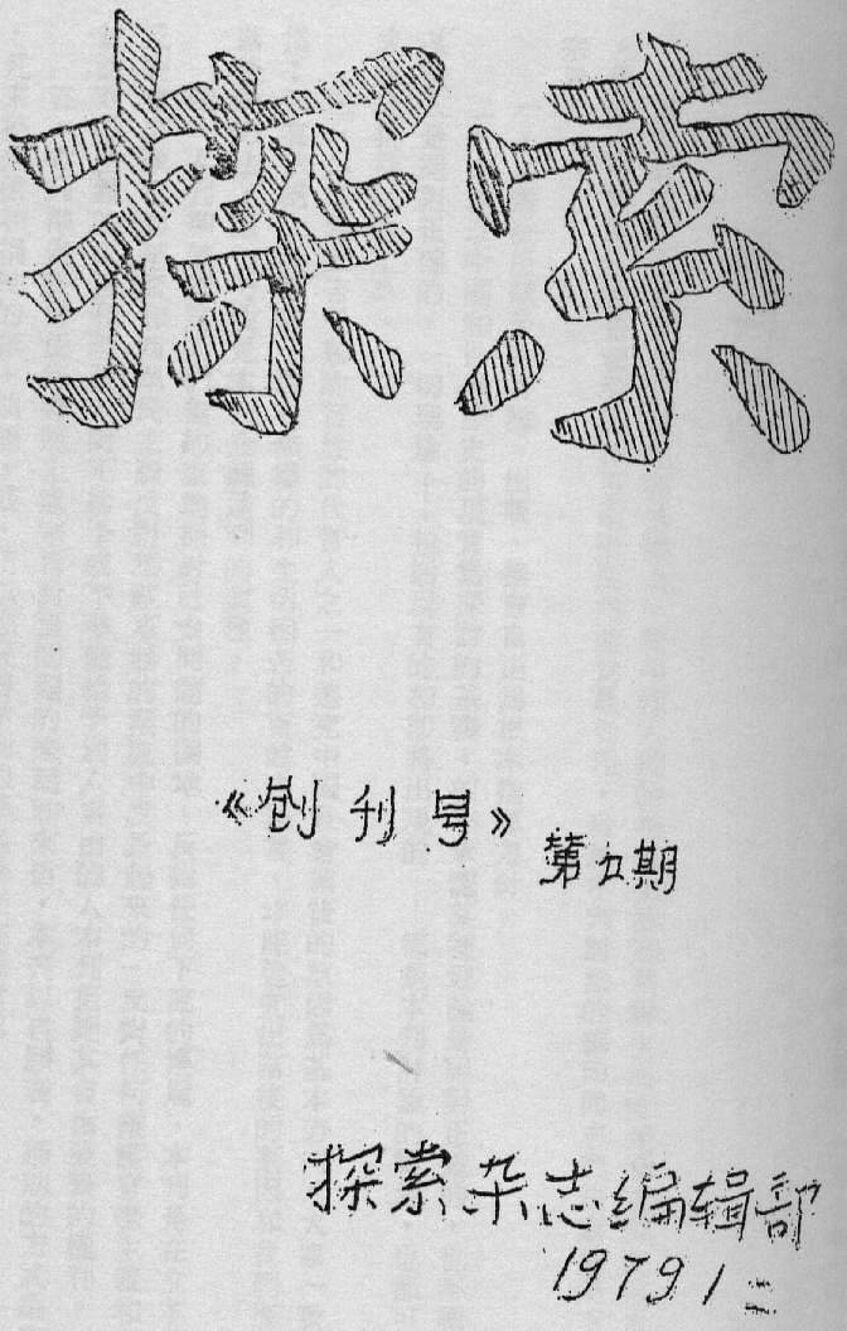
The first issue of "Exploration" (Tansuo) from January 1979.
"Exploration" (Tansuo 探索)
On December 15, 1978 a poster at the Democracy Wall that carried the title "The Fifth Modernization" (第五个现代化) attracted a lot of attention. The author Wei Jingsheng was a 29-year-old electrician from a family of high-ranking communist officials. In his text he argued that the "Four Modernizations" (in agriculture, industry, defense and science) currently propagated by the leadership needed a fifth to function, and that was political democracy.
Encouraged by the debates around this proposal, Wei decided together with some colleagues to launch his own journal "Exploration". It became the mouthpiece of a more radical group in the Democracy Movement that challenged the communist system in China as such.
The first issue of the magazine basically carried the text on the "Fifth Modernization", in subsequent issues there were contributions on human rights, equality and political prisons in China.
On March 25, 1979, just after the proclamation of the "Four Basic Principles" (that disallowed criticism of the Communist Party, Marxism-Leninism and the teachings of Mao), Wei published his famous manifesto "Democracy or New Dictatorship" (要民主还是要新的独裁), where he called Deng Xiaoping "a dictator ... like Mao". A few days later Wei Jingsheg was arrested, but his collegues continued to publish the Journal for a few more months.
The Literary Magazine "Today" (Jintian 今天)
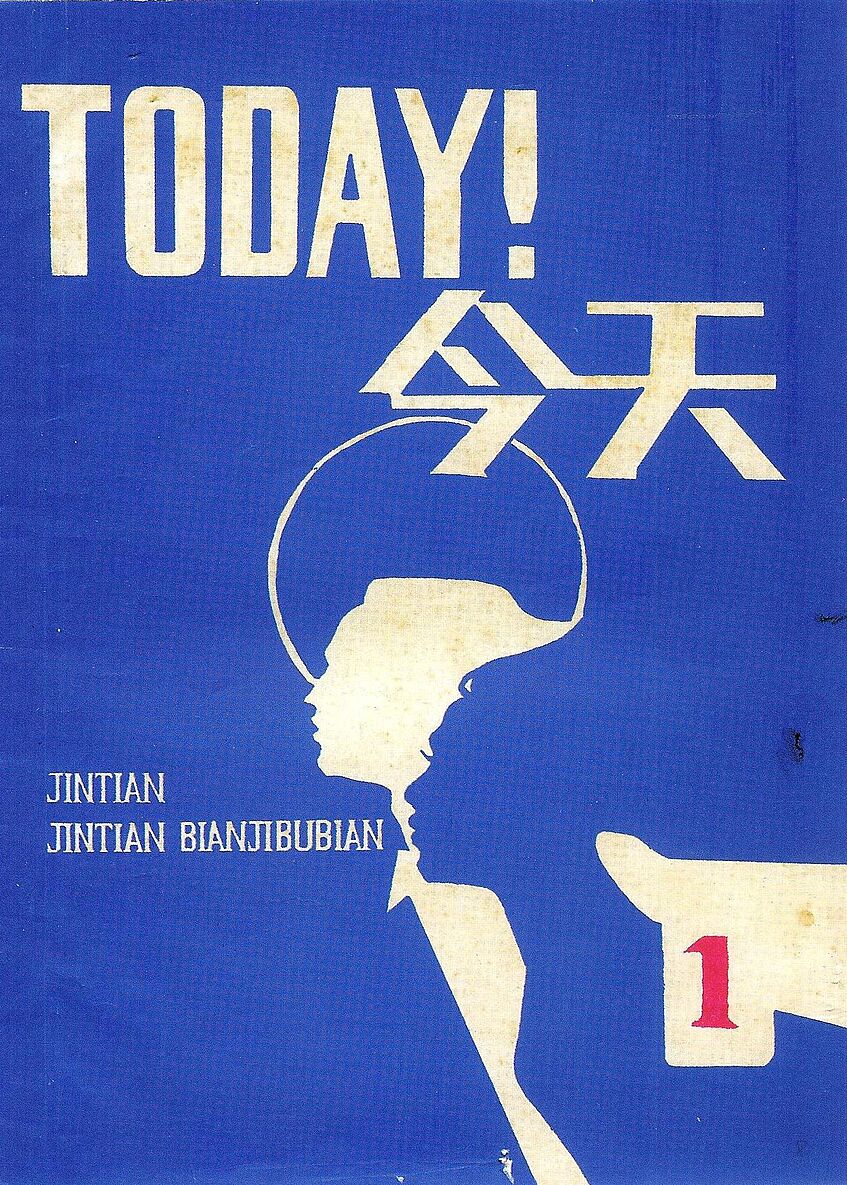
The artist Huang Rui has designed the cover of the "Today" magazine.
The Literary Magazine "Today" (Jintian 今天)
The first issue still carried the English subtitle "The Moment", a second re-print and all subsequent issues were called "Today". The journal represented Independent artists and writers, its founders were - among others - the writers Mang Ke (芒克) and Bei Dao (北岛) and the painter Huang Rui (黄锐).
The early editions were produced with particular effort, carrying specially manufactured artworks such as original wood block prints by Ma Desheng (马德升) or Qu Leilei (曲磊磊) that were individually affixed to each copy.
"Today" mainly carried short stories, poems and literary criticism, thus drawing a clear line to the more politically orientated journals.
The magazine also published translations of texts of foreign authors like Graham Greene or Heinrich Böll, that had hitherto not been accessible in Chinese. But more important probably was that it provided space for a few little-known Chinese avant-garde writers, who a few years later were counted among the most famous contemporary poets, like Bei Dao, who has been nominated several times for the Nobel Prize in Literature, Gu Cheng (顾城), Yang Lian (杨炼) or Shu Ting (舒婷), the woman who is said to have founded the so-called "Misty Poetry" (朦胧诗).
"Today" published nine issues till 1980 when authorities demanded its closure. In 1989 the journal is relaunched in Norway, since 2003 it is continued by Bei Dao in Hong Kong as a literary magazine.
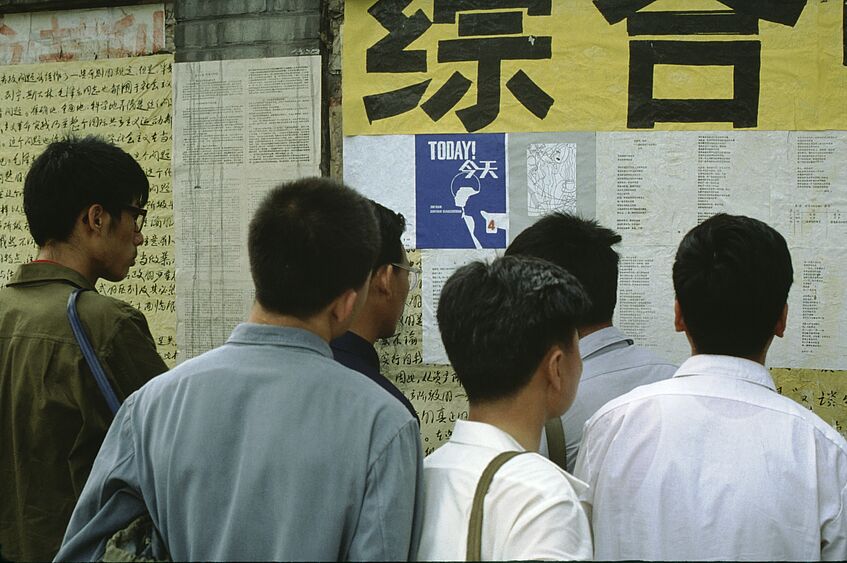
"Today" (here its issue number 4) was also posted at the Democracy Wall (Beijing, June 1979)
The Magazine "The Spring of Peking" (Beijing zhi Chun 北京之春)
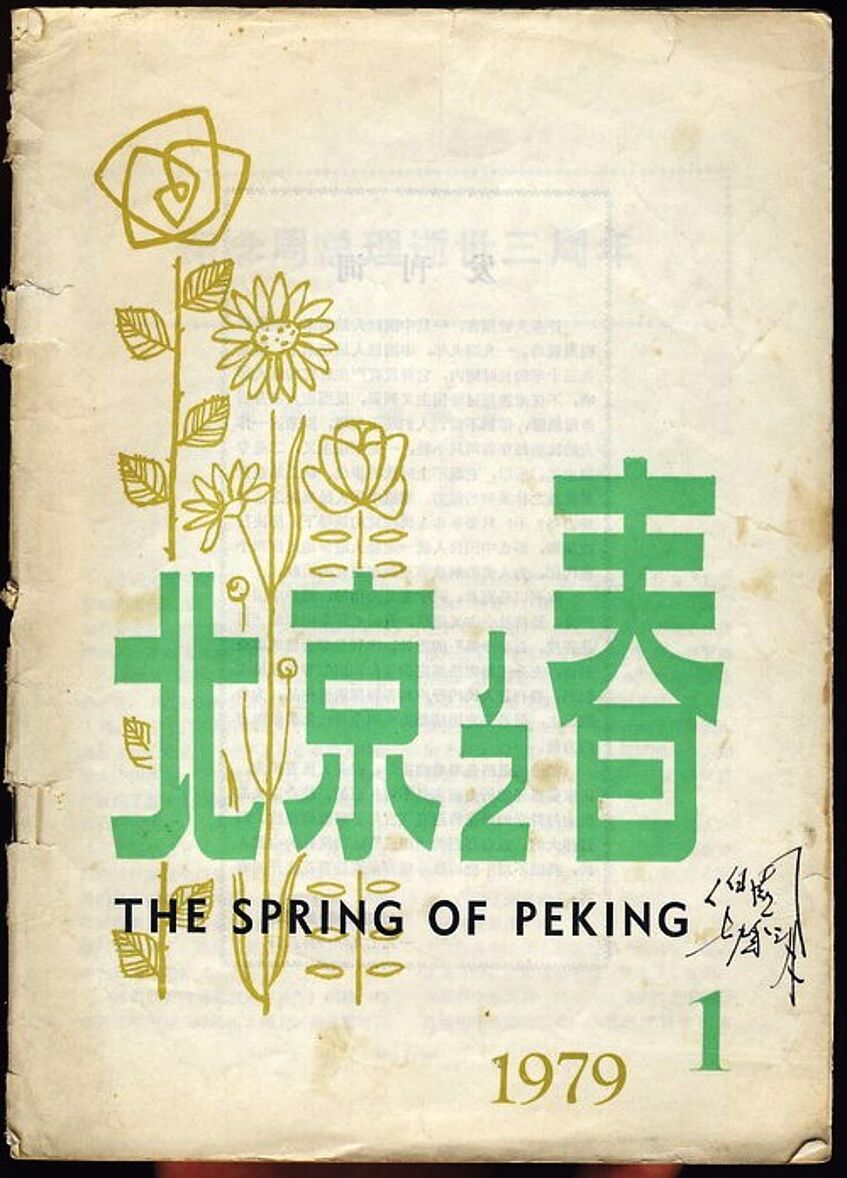
The only professionally printed issue among the independent journals ("The Spring of Peking", number 1)
The Magazine "The Spring of Peking" (Beijing zhi Chun 北京之春)
This journal maintained the closest relations with reformers inside the Communist Party and particularly the Communist Youth League. Leading Editors like Zhou Weimin (周为民) or the physics student Wang Juntao (王军涛) were themselves briefly members of the CYL Central Committee. At one instance the journal was able - with the help of officials - to publish a professionally printed issue with a circulation of 10.000 copies. While "The Spring of Peking" tried to co-operate with reform-orientated officials close to Hu Yaobang (胡耀邦), the journal kept itself more or less apart from other more outspoken publications.
The topics taken up were largely the same as those discussed by the reformers inside the party, e.g. the demand for rehabilitation of the disgraced and deceased (during the Cultural Revolution) former State President Liu Shaoqi, or the question whether the teachings of Mao had to be taken literally. But "The Spring of Peking" also carried literary contributions. The most famous is a political fiction with the title "A Tragedy in the Year 2000" by a still unknown author. It painted a bleak future of a collapse of all reform efforts in China, and a subsequent revival of devastating power struggles in the party.
From 1993 a magazine with the same Chinese titel (but now called "Beijing Spring" in English) is published in New York. It became the main mouthpiece of the democracy movement in exile, with some authors that had already written for the independent journals in China. From 2010 "Beijing Spring" continued to appear as a digital edition.
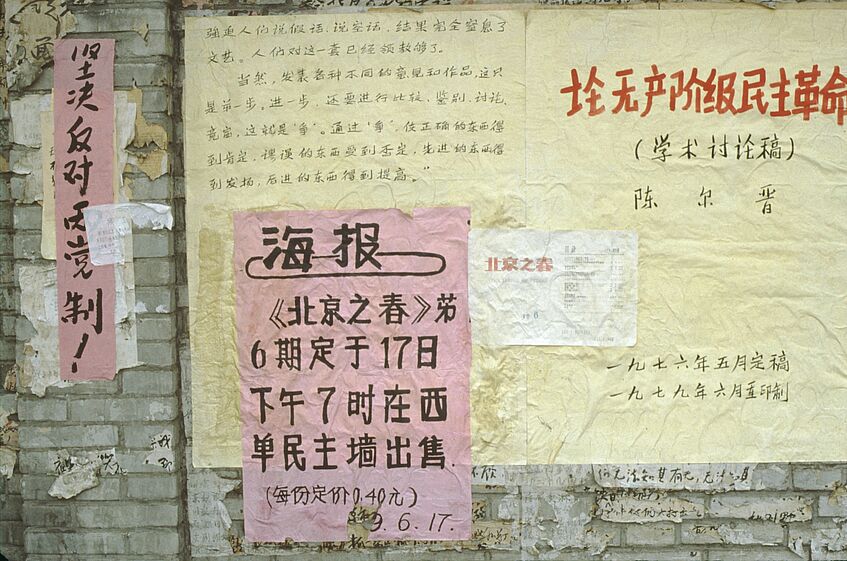
Poster at the Democracy Wall announcing the sale of a new magazine (June 1979)
Other Important Publications
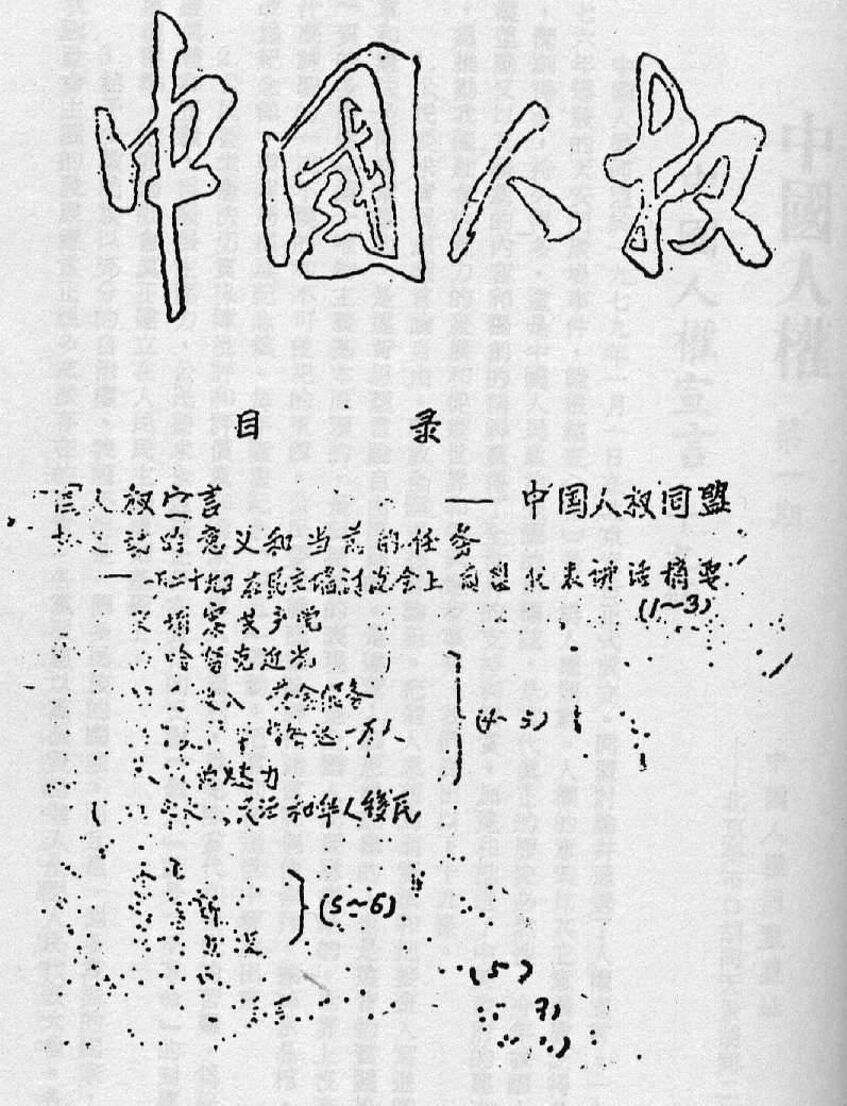
Table of contents of one issue of "Human Rights in China". The often poor printing quality is obvious here.
Other Important Publications
In the early days of the Democracy Movement Ren Wanding (任畹町) founded the magazine "Human Rights in China" (Zhongguo Renquan 中国人权) that published a 19-points "Chinese Human Rights Manifesto". The Guizhou group of Huang Xiang also had their own journal in Beijing called "Enlightenment" (Qimeng 启蒙). Another magazine was the "Reference News for the Masses" (Qunzhong Cankao Xiaoxi 群众参考消息). The title referred to the official daily publication "Reference News" (Cankao Xiaoxi 参考消息) that translated excerpts from foreign media for a selected audience of officials and party members, but was not distributed to "common people". Another journal called "Fertile Soil" (Wotu 沃土) focussed on literature and social issues. One of its editors was Hu Ping (胡平), who was to win the local elections at Peking University in November 1980.
Independent Journals in the Provinces
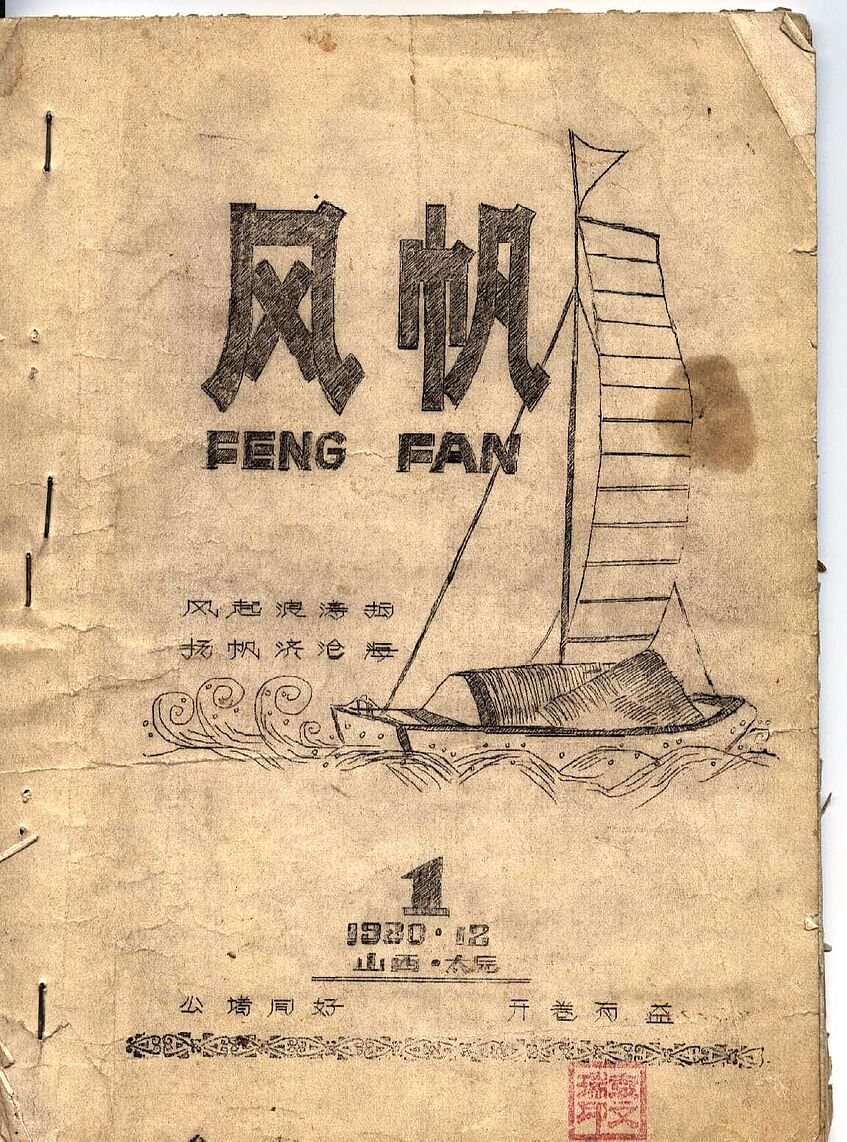
Cover page of "The Sail" (Taiyuan, Shanxi)
Independent Journals in the Provinces
It took little time after the appearance of the first "democratic" publications in Beijing, that a number of provincial cities also saw the publication of their own independent journals. Their conditions were even worse, they could print only small numbers, and the quality of their content was not always up to the standards.
The liveliest scene existed in Canton (Guangzhou). Several members of the former "Li Yizhe Group" (led by Wang Xizhe 王希哲) joined the Democracy Movement immediately after their release in 1979.
Well-known titles are the "Voice of the People" (Renmin zhi Sheng 人民之声) and the "Path of the People" (Renmin zhi Lu 人民之路). Also in Shanghai there was a magazine called "Voice of the People". Other publications that gained nationwide importance for the Democracy Movement were "The Chime" (Zhongsheng 钟声) in Wuhan, "The Spring of Zhejiang" (Zhejiang zhi Chun 浙江之春) in Hangzhou, "Sea Spray" (Hailanghua 海浪花) in Qingdao, "The Sail" (Fengfan 风帆) in Taiyuan and "Bohai Shores" (Bohai zhi Bin 渤海之滨) in Tianjin.
The French sinologist and former embassy official Emmanuel Bellefroid (under his pseudonym Claude Widor) has listed more then one hundred titles of publications associated with the Democracy Movement in over 30 Chinese cities. (The Samizdat Press in China's Provinces, 1979–1981: An Annotated Guide. Compiled by Claude Widor. Hoover Press bibliographical series, No. 70. Stanford CA, 1987)
